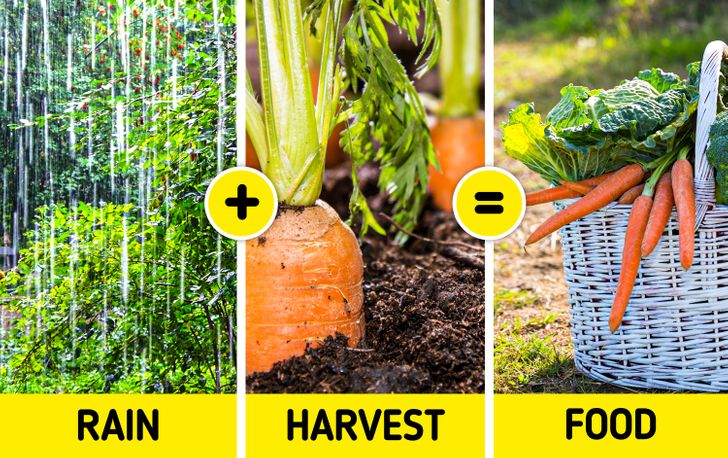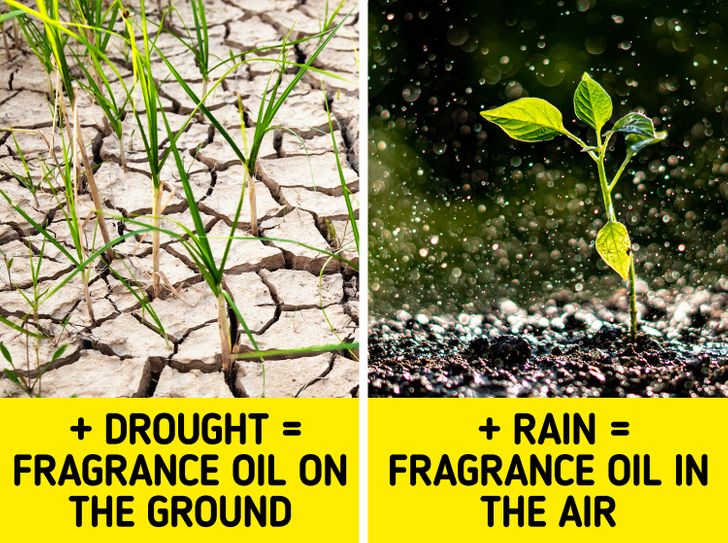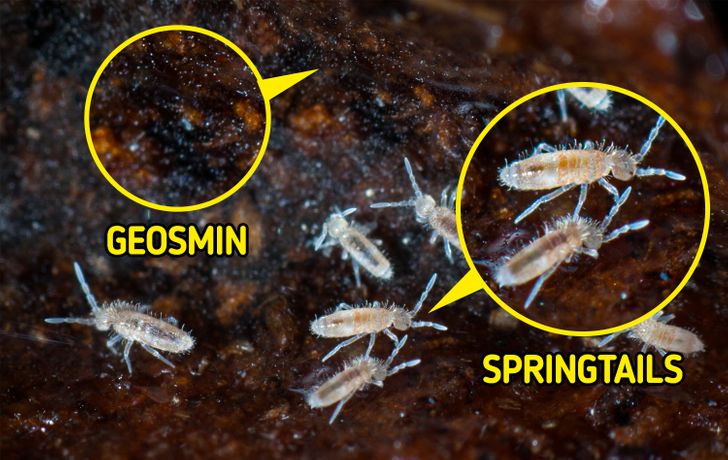so nice- Love it#*🌻💓
Why Rain and Wet Soil Smell So Good

Everything smells. Every day, we are surrounded by hundreds of scents — we like some more than others, which is subjective. Nevertheless, there are certain aromas that unquestionably bring pleasure to all of us. The smell of both rain and wet earth can bring about an undeniable feeling of pleasure. What is it that provokes this kind of relief that we experience when the first drops of rain start to fall and everything turns fresh and wet?
Bright Side wanted to know more about this aroma and its effects. What is it exactly? Why does it smell so good? What we have discovered has really surprised us and helped us to understand — or rather, remember — that there’s a reason for everything when it comes to nature.
We smell with our heads.
Those in-the-know claim that the sense of smell, the brain, and the memory are linked. It has likely happened to all of us: you were walking down the street and suddenly were overcome by a certain aroma. Without thinking about it, scenes from our childhood spring to mind. The scent can sometimes be difficult to distinguish — like the smell of summer, for example, or more precisely, of linen, coffee, and wet earth.
Scientists and neurologists who investigate this connection have explained to us what this unexpected memory is all about. Though it may seem like some kind of magic, it actually isn’t. It has a scientific explanation — our brain’s anatomy links our sense of smell, our mood, and our emotions.
When it comes to the perception of smell, the olfactory bulb is involved. It is a neural structure located in the front part of your brain and it is considered primal since it’s believed to have been present in the brains of the first mammals.
Why do the scents of rain and wet earth smell so good?
Surely, this must’ve happened to us more than once. After several days of extreme heat, the so-longed-for clouds appear, the sky gets darker, and rain comes, bringing on the smell of wet ground, stone, and grass along with it. Who wouldn’t feel at ease when surrounded by this fresh and sweet aroma? Our minds are then flooded with a series of positive thoughts linked to that feeling of relief.
If we link this sensation to the primary function attributed to the sense of smell — which is the act of detecting elements that our body needs for sustenance and distinguishing them from those that may be harmful — the theory held by scientists starts making sense. According to this, our ancestors had established a strong positive connection with the smell of rain because it indicated the end of the dry season, which increased the chances of survival.
Thanks to the rain, plants are reborn and crops are stimulated, which consequently helps food production. It is basically the synonym of life.
Petrichor, a magic word
This unique scent also has a unique name, “petrichor.” In 1964, 2 Australian geologists coined this term to refer to a phenomenon they had discovered. During the dry season, plants exude an essential fragrance oil absorbed by the surface of dry rocks and soil, which is released into the air when it comes into contact with water. Thus, when a drought lasts for a long time, more oil accumulates, and the aroma gets stronger when the rain finally comes.
However, this essential, fragrant oil is not produced just because. Both researchers noticed that it inhibits seed germination, and they arrived at the conclusion that plants generate it so as not to grow during dry weather since it would be difficult for them to survive. This oil is only one of the components that make up this special aroma. There are more.
A scent produced by bacteria
This particular aroma is produced when certain airborne oils are combined with another substance: geosmin (yes, another difficult word). This substance is produced by a group of bacteria and some soil-dwelling fungi that are only perceptible when the earth is wet. These organisms secrete the compound when producing spores. Then, by the force of the rain landing on the soil, the spores are sent up into the air, which will then carry the scent into our noses.
Studies have revealed that our sense of smell is extremely sensitive to geosmin. Some people may detect it even at very low concentrations. This explains why we can smell that scent, even when it’s not raining where we are, although, it may be raining in nearby areas. If the wind is strong enough, it can carry this scent to places where there’s no rain.
The production of geosmin by this bacteria is also connected to the preservation of life. A study has shown that this scent guides springtails, tiny animals resembling insects, toward the bacteria that produce the scent. They follow the scented trail because it guides them to their source of food. So, why would bacteria do this? Why would they wish to be ingested by an animal? Moreover, why would they help springtails by guiding them in the right direction?
There’s a reason for everything, even in the case of microorganisms. A bite will ensure their expansion. Indeed, after feeding, springtails take with them the bacterial spores, consequently helping this colony reach new habitats.
Plants exude essential fragrance oils to protect the lives of their seeds, bacteria secrete geosmin to ensure its reproduction, and we smell the wet earth and somehow link it to a clear survival sign. It’s settled: in nature, everything happens for a reason.
Do you have any further details about the scent of wet earth that we didn’t mention in this article? Do you know of other explanations as to why we find different aromas so pleasant?
Comments
There's an essential oil made of this in Kannuj, India .. look it up..
Related Reads
The Drastic Difference Plastic Surgery Makes on Celebrities of the Same Age

12 Life Twists That Feel Like a Rollercoaster With No Seatbelt

I Helped a Friend Have a Child — Now He Wants a Relationship I Never Agreed To

I Refuse to Keep Paying for “Family Trips” I Never Get to Go On

I Refused to Beg My DIL for Forgiveness—Then Suddenly She Needed Me

I Refused to Obey My DIL’s Weird Demands, I’m a MIL, Not an Errand Girl

I Refuse to Share My Inheritance With My Sister—She Doesn’t Deserve a Penny of It

13 Plot Twists So Wild, They Could Make Spielberg Say, “I Wish I Directed That”

13 Times People Accidentally Uncovered Someone’s Biggest Secret

I Refuse to Let the Former Owner Get Married in My Backyard—My Kindness Stops Here

My Husband Made Me Care for His Sick Mother, So I Served a Payback He Won’t Forget

13 People Share the Things They’ve Been Hiding From Their Partners for Years







